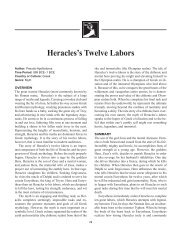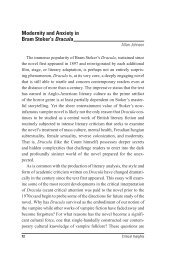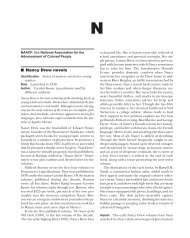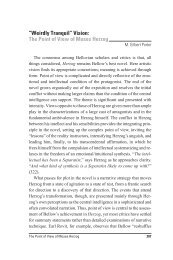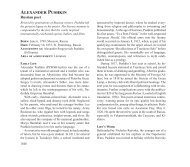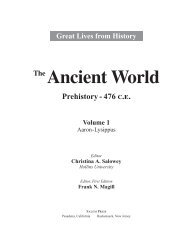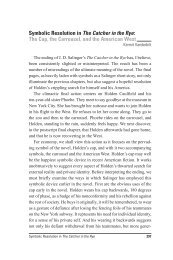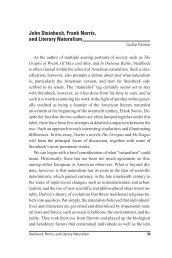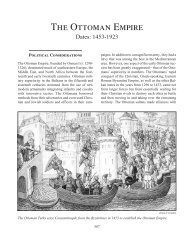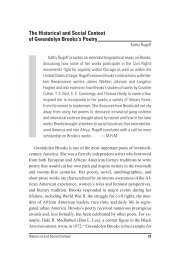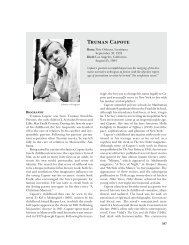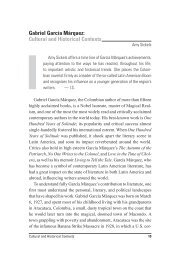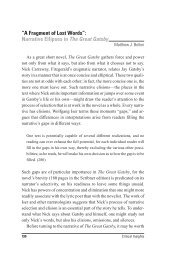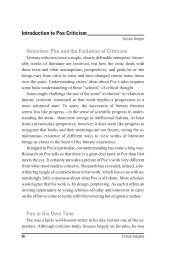You also want an ePaper? Increase the reach of your titles
YUMPU automatically turns print PDFs into web optimized ePapers that Google loves.
Critical Survey of Poetry Neruda, Pablo<br />
lyric evocation of his entire life, its final pages written<br />
after the coup that overthrew Salvador Allende. Neruda’s<br />
translations include works by Rainer Maria Rilke, William<br />
Shakespeare, and William Blake. The volume Para<br />
nacer he nacido (1978; Passions and Impressions, 1983)<br />
includes prose poems, travel impressions, and the speech<br />
that Neruda delivered on his acceptance of the Nobel<br />
Prize. He has written a novel, El habitante y su esperanza<br />
(1926); a poetic drama, Fulgor y muerte de Joaquín<br />
Murieta (pb. 1967; Splendor and Death of Joaquin<br />
Murieta, 1972); and essays on Shakespeare, Carlo Levi,<br />
Vladimir Mayakovsky, Paul Éluard, and Federico García<br />
Lorca, as well as several works of political concern.<br />
Achievements<br />
Winner of the Nobel Prize in 1971, Pablo Neruda is<br />
one of the most widely read poets in the world today.<br />
His most popular book, Twenty Love Poems and a Song<br />
of Despair, has more than a million copies in print and,<br />
Pablo Neruda (Library of Congress)<br />
like much of his work, has been translated from Spanish<br />
into more than twenty languages. Neruda was so prolific<br />
a writer that nine of his collections of poems have been<br />
published posthumously.<br />
Neruda’s goal was to liberate Spanish poetry from<br />
the literary strictures of the nineteenth century and bring<br />
it into the twentieth century by returning verse to its<br />
popular sources. In Memoirs, written just before his<br />
death, Neruda congratulates himself for having made<br />
poetry a respected profession through his discovery that<br />
his own aspirations are representative of those shared by<br />
men and women on three continents. Writing on the rugged<br />
coast of southern Chile, Neruda found passion and<br />
beauty in the harshness of a world that hardens its inhabitants,<br />
strengthening but sometimes silencing them. His<br />
purpose was to give his fellowmen the voice they too often<br />
lacked.<br />
Biography<br />
Pablo Neruda was born Neftalí Ricardo Reyes Basoalto<br />
in the frontier town of Parral in the southern part of<br />
Chile on July 12, 1904. His mother died of tuberculosis<br />
a few days after his birth, and Neruda lived with his<br />
stepmother and father, a railroad conductor, in a tenement<br />
house with two other families. Hard work and an<br />
early introduction to literature and to the mysteries<br />
of manhood distinguished his first seventeen years. In<br />
school, the famous Chilean educator and poet Gabriela<br />
Mistral, herself a Nobel Prize winner, introduced the<br />
young Neruda to the great nineteenth century Russian<br />
novelists. In the fall of his sixteenth year, while he was<br />
assisting in the wheat harvest, a woman whom he was<br />
later unable to identify first introduced the young man to<br />
sex. A wide-ranging, voracious appetite for books and<br />
the wonders of love are memories to which Neruda continually<br />
returns in his work, as well as to the harsh Chilean<br />
landscape and the problems of survival that confronted<br />
his countrymen.<br />
His father’s determination that Neruda should have a<br />
profession took the young poet to Santiago, where he intended<br />
to study French literature at the university. He<br />
had learned French and English in Temuco from his<br />
neighbors, many of whom were immigrants. His affiliation<br />
as contributor to the journal Claridad with the politically<br />
active student group, Federación de Estudiantes,<br />
2755



